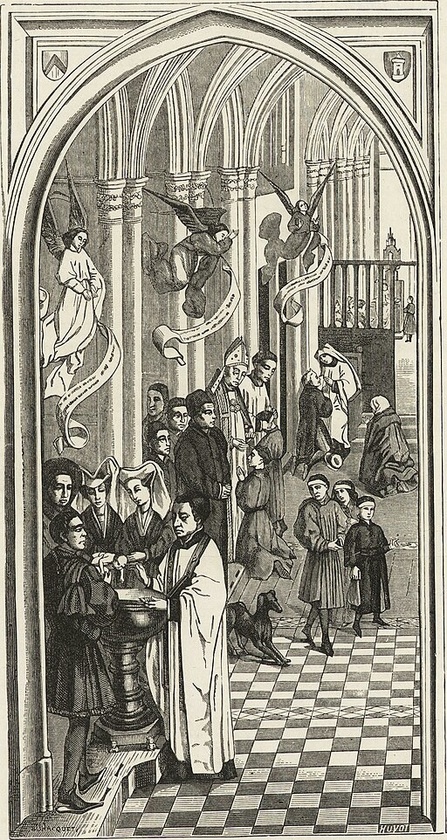Someone posted on FB asking how the many statements in Pope St. Gregory the Great decrying the idea of a universal bishop can be reconciled with the ecclesiology of Vatican 1 (1870). I responded by saying that Gregory's thoughts are not always consistent, and need some reconciling.
"For you said excellently and rightly that these teachers are not opposed to each other, just as Paul and James are not, with one saying that a human being is justified by faith without works [Gal. 2:16, Eph. 2:8-9], while the other writes that faith without works is dead [Jas. 2:26]. For Paul spoke of the faith that precedes baptism, which requires only the consent of the whole heart to the confession, without its being preceded by a life of good works, a faith that justifies all that partake in some way of evil, when in the divine laver of regeneration he confesses his faith that comes from instruction. James, on the other hand, speaks of the faith that follows baptism, that it is dead if one possesses it without works, that is, if one does not confirm it by deeds of justice. For baptism is the pledge of a life ordered to the good... But we can easily draw a solution form the divine scriptures. For it is the one Abraham who at distinct times is the image, now of one faith, now of the other, of that which precedes baptism and does not require works, but only confession and the saving word by which we are justified when we have faith in Christ, and of that which follows baptism and is linked to works. For we know that the circumcision in the flesh of old was practised as a type, an image that was fulfilled in saving baptism. By the removal of the foreskin it teaches renunciation and rebirth according to the flesh and makes those who are circumcised into sons of God... it was after Abraham was circumcised that he was commanded to offer up Isaac on the high place, that he fulfilled the commandment, and that he was justified by works, again prefuguring in his own person the faith that follows baptism-- which is the figurative circumcision-- and that justifies a human being through works.... Thus, manifestly the same Spirit does not contradict Himself now here, now there, who by the apostles and by the ancient writings of the Law spoke concerning faith, of that which precedes baptism and that which follows baptism. The one justifies by simple confession alone without works him who approaches the divine sblution as a viaticum that suffices him for salvation should he suddently depart this world. The other requires of one who has been baptized the testimony of good deeds, and it raises him to a peffect state and a lofty dignity. It is therefore most fitting that James saying concerning this: 'Faith is completed through works' [Jas. 2:22]."
Severus of Antioch, 2nd Letter to Julian, Eng. Trans. Bronwen Neil & Pauline Allen, Conflict & Negotiation in the Early Church: Letters from Late Antiquity, Translated from the Greek, Latin, and Syriac (Washington, D.C.: The Catholic University of America Press, 2020), 107-109]
Quite similar to other Church Fathers, Severus of Antioch understands that there are two ways of speaking of justification. These two ways depends on two phases of life in each individual Christian. There is the pre-baptismal phase and the post-baptismal phase. Prior to baptism, a man is only required to have faith in God by way of confessing Christ, akin to a Catechumen, and he is justified in the eyes of God simply by his confession of faith without any works at all. For Severus, baptism is the fulfillment of circumcision in ancient Israel, and thus he understands the uncircumcised phase of Abraham's life to be tantamount to the pre-baptismal phase. Therefore, a justification by faith without any works at all characterizes the justification of Abraham in Gen. 15:6 since Abraham here was uncircumcised, i.e., equivalent to being unbaptized.
However, after Abraham is circumcised, then there is a demand on him to have both faith and works and to be justified in the eyes of God by passing the test of works. It was only after Abraham's circumcision, i.e., spiritual baptism, that God required Abraham to pass the test of being willing to sacrifice his son Isaac in order to be justified and saved.
This is very interesting, even if I do not agree with it. Essentially, Severus sees the pre-circumcision phase of Abraham (Gen. 12-17), about 20+ years, as a phase of life where Abraham is equivalent to a New Covenant Catechumen before baptism. Consequently, Abraham only needed faith during this phase because baptism is what gives the human being power to live out a good life from faith and works. But since Abraham is considered unbaptized before his circumcision, he only has to have the confession of faith alone to be saved. After circumcision, however, Abraham is bound to live out good works since the grace of baptism orders the human soul to the good by God's power.
Is this a defense of Protestant theology? It depends on how Severus defines faith. If, for Severus, the possession of faith is equal to faith understood as a virtue and an inward sanctity that is in the human heart, even without outward works, then Severus is more on the Catholic/Orthodox side of justification. But if he means a pure intellectual assent or a mere trust that God will save him, then he would probably be even more at variance with biblical revelation than even Protestants, since the latter at least believe one who has the gift of faith is necessarily sanctified.

The following is a response to an Evangelical who said the following:
<<In fact, there is nothing definitive in the historical record that speaks to the regular baptism of babies until the middle of the 3rd century. >>
It is a bit painful to see this statement being made without further comment. Though there is doubt as to its origin being "Roman", many scholars would date the Apostolic Tradition, often attributed to Hippolytus of Rome, to the beginning of the 3rd century. I understand the recent scholarship on this (c.f. Bradshaw, Johnson, Phillips, et. al.), but it remains conventional to see this as an early 3rd century compilation. I think a good defense of it being both Roman and early 3rd century (and perhaps even prior) is given by Alistair Stewart, a leading scholar of Christian liturgical origins, in vol. 54 of the Popular Patristic Series put out by St. Vladimir's Seminary Press. I won't go into those arguments here, nor will I defend them. I would just add that the AT makes it pretty clear that children, ...

Abraham's belief in God's promise is a God-pleasing virtue that includes, therefore, a formation of charity and hope towards God. It constitutes a faith that, for the ungodly, is a repentant faith. For the saint, a firm commitment to persevere with God's plan over and against falling to the temptation to go one's own way. Therefore, the faith of Abraham does indeed serve to be an interior sanctity that God recognizes as the "obedience of faith". Nevertheless, God credits more to Abraham than what his faith gives to God. We have to keep in mind that St. Paul sees in the justification act upon Abraham the justification of a man who is, whatever else might be said that was praiseworthy up to this point (Rom. 4:18-22), ungodly. Therefore, in the imputation of Abraham's faith as righteousness, something of a merciful grace is being applied. He is not just recognizing the value of Abraham's faith as meriting justification, i.e., the remission of sins and the sanctifying renewal of the interior ...














